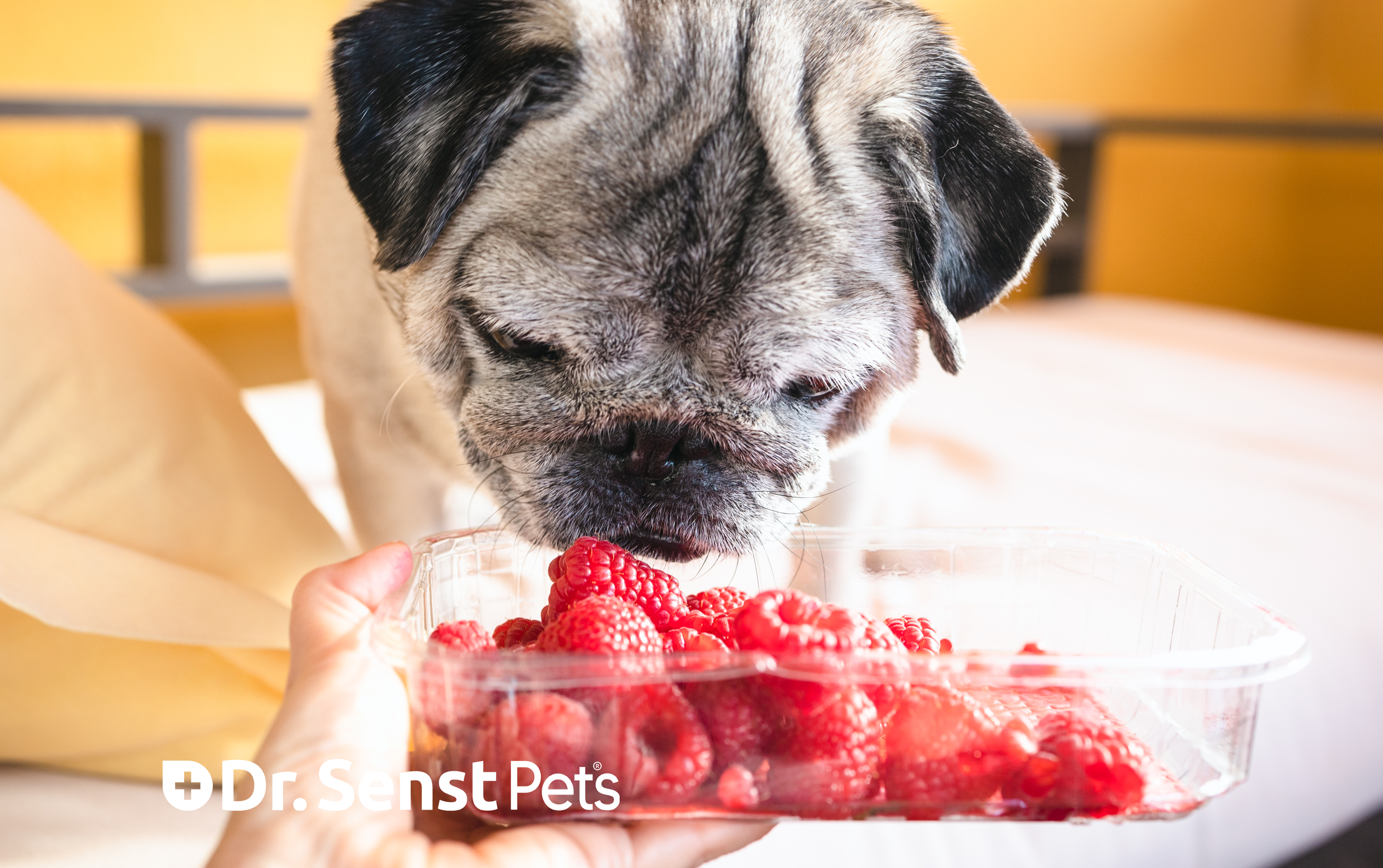
- by Dr.Thilo Senst
Can Dogs Eat Raspberries? Nutritional Benefits and Feeding Tips
- by Dr.Thilo Senst
As a responsible pet owner, you’re always looking for new ways to treat your dog while ensuring their diet remains healthy and balanced. One question often asked is, can dogs eat raspberries? This tiny, delicious fruit is packed with nutrients for humans, but is it safe for our four-legged friends? Let’s explore the nutritional value, potential benefits, and risks of feeding raspberries to your dog.
Yes, dogs can eat raspberries in moderation. These berries are not only safe but can be beneficial for your dog’s overall health. Raspberries are low in sugar and calories, making them a great snack for dogs, especially those that are overweight or have diabetes. However, like with any treat, moderation is key.
Raspberries contain a variety of nutrients that can support your dog’s health, such as:
Raspberries are packed with vitamin C and antioxidants, both of which support your dog’s immune system. Antioxidants work to neutralise free radicals, reducing the risk of chronic illnesses, including certain types of cancer.
Thanks to their high fibre content, raspberries can improve your dog’s digestive health by regulating bowel movements and preventing constipation. Dogs with sensitive stomachs or irregular digestion can benefit from occasional servings of these berries, especially when paired with supplements like Dr. Senst Probiotics For Gut Health Soft Chews.
For overweight dogs or those with diabetes, raspberries are a fantastic low-calorie snack. They’re low in sugar compared to other fruits, making them an excellent alternative for dogs who need to maintain or reduce their weight.
Raspberries contain natural anti-inflammatory compounds, which can be particularly beneficial for dogs suffering from arthritis or joint pain. The antioxidants in raspberries help reduce inflammation, improving mobility and comfort for older or more active dogs.
While raspberries can be a great treat, they shouldn’t be a daily snack. It’s best to offer them in moderation, especially due to their small amount of natural sugar and fibre content, which, if consumed in excess, can cause digestive upset. Stick to a few berries at a time and monitor how your dog reacts.
Analogy: Think of raspberries like a delicious dessert for your dog. Just as you wouldn’t eat cake every day, raspberries should be enjoyed in small amounts. Too much of a good thing can lead to problems, even with the healthiest foods.
Here are some tips for safely feeding raspberries to your dog:
Always avoid serving raspberries with any added sweeteners, such as artificial sweeteners like xylitol, which can be toxic to dogs.
According to a recent survey conducted by Pet Health UK, 58% of dog owners in the UK have fed their dogs fresh fruits, including berries like raspberries, as a healthy treat option (Pet Health UK, 2022). Another study from the British Veterinary Association highlighted that 72% of dogs on a balanced diet that includes fruits have experienced improved digestion and energy levels (BVA, 2023).
While raspberries are generally safe, there are a few risks to be aware of:
1. Can puppies eat raspberries?
Yes, puppies can eat raspberries, but only in small quantities. They should be introduced slowly, and it's important to monitor for any adverse reactions.
2. Are raspberry-flavoured products safe for dogs?
No, many raspberry-flavoured products contain artificial sweeteners or additives that are harmful to dogs. Always opt for fresh, natural raspberries.
3. Can raspberries cause allergies in dogs?
Though uncommon, some dogs may develop an allergic reaction to raspberries. Symptoms include itching, swelling, or gastrointestinal upset. If you suspect an allergy, discontinue feeding and consult your vet.
4. Can dogs eat frozen raspberries?
Yes, frozen raspberries are safe and can be a great treat, especially in warm weather. Just be sure they are plain, without any added ingredients.
5. How many raspberries can I give my dog?
For small dogs, one or two raspberries are sufficient, while larger dogs can enjoy up to five or six at a time. Always monitor for any signs of digestive discomfort.
| Nutrient | Raspberries (100g) | Apples (100g) | Blueberries (100g) |
|---|---|---|---|
| Calories | 52 kcal | 52 kcal | 57 kcal |
| Sugar | 4.4g | 10g | 9.7g |
| Fibre | 6.5g | 2.4g | 2.4g |
| Vitamin C | 26mg | 7mg | 9.7mg |
| Antioxidants | High | Moderate | High |
This table shows how raspberries compare to other common fruits that are safe for dogs. While apples and blueberries offer great nutritional value, raspberries have the lowest sugar content and the highest fibre.
Raspberries are a delicious, nutritious, and safe treat for dogs when fed in moderation. They offer a range of health benefits, from improved digestion to boosted immune function. While raspberries should not replace a balanced diet, they make a fantastic supplement to your dog’s regular meals.
To ensure your dog’s overall health, consider combining raspberries with Dr. Senst Probiotics For Gut Health Soft Chews. These chews support digestive function, making them an excellent pairing with fibre-rich foods like raspberries. Additionally, if your dog suffers from allergies or itching, the Dr. Senst Anti Itch & Allergy Relief Soft Chews can provide relief while enhancing their diet.
Treat your dog to a healthy and happy life with Dr. Senst’s range of wellness products. Try our Probiotics For Gut Health Soft Chews or Anti Itch & Allergy Relief Soft Chews to complement your dog’s diet and keep them feeling their best.
![]()
Enter your details & download our comprehensive 50+ page printable Dr. Senst Pet Care Planner completley FREE! - keep track of all your pet’s needs, from medical history and training to vet visits, grooming, diet, and more!










Share:
Can Dogs Eat Eggs? An Expert’s Insight on This Nutritious Food for Dogs
Antiseptic Flea Treatment for Dogs: Prevention and Relief